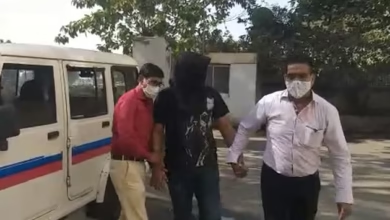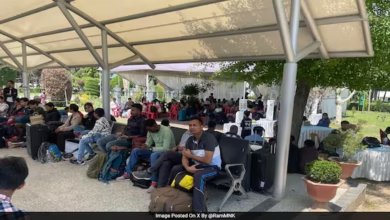Exclusive | Indians Losing ₹1,000 Crore Every Month to Southeast Asia-Based Cyber Scams: MHA Analysis
In a shocking revelation, the Ministry of Home Affairs (MHA) has confirmed that Indians are collectively losing nearly ₹1,000 crore each month to organized cybercrime networks operating from Southeast Asian countries — primarily Cambodia, Myanmar, Vietnam, Laos, and Thailand.

According to official data compiled by the Indian Cyber Crime Coordination Centre (I4C), cyber scams originating from these countries accounted for over ₹5,000 crore out of the total ₹7,000 crore lost to cyber frauds from January to May 2025. The analysis suggests a rapidly growing international cybercrime crisis that is aggressively targeting Indian citizens and draining the national economy.
Trafficked Indians Forced into Cybercrime
The MHA reports that many of these fraud operations are being run from high-security compounds allegedly controlled by Chinese syndicates. These scam centres are believed to house trafficked individuals—including thousands of Indians—who are forced to operate fake investment and job schemes targeting unsuspecting victims across the globe.
A senior official told Hacktechnews that rescued individuals have revealed disturbing details of coercion and exploitation. “These cybercrime compounds aren’t just operating scams; they are running modern-day slavery rings,” the official said.
Massive Financial Losses Every Month
The monthly breakdown of losses paints a grim picture:
-
January: ₹1,192 crore
-
February: ₹951 crore
-
March: ₹1,000 crore
-
April: ₹731 crore
-
May: ₹999 crore
The data is based on reports submitted to the Citizen Financial Cyber Fraud Reporting and Management System (CFCFRMS), a digital platform under I4C that helps victims report cyber frauds.
Diplomatic Talks and Crackdown Plan
In a significant diplomatic move, Cambodian officials recently met with Indian authorities in New Delhi. The meeting—organized by the Ministry of External Affairs (MEA) and attended by multiple central agencies—focused on identifying and dismantling scam hubs in Cambodia. Cambodian representatives requested India to share exact geographical coordinates of suspected locations to initiate crackdowns.
The Indian government, with help from intelligence agencies and rescued victims, has already mapped out:
-
45 scam compounds in Cambodia
-
5 in Laos
-
1 in Myanmar
These centres reportedly house victims from various continents—including Asia, Africa, Europe, and the Americas.
Types of Cyber Scams Identified
The probe has identified three major categories of scams:
-
Stock Trading/Investment Frauds – Fake trading platforms and misleading investment offers.
-
Digital Arrest Scams – Impersonating law enforcement and blackmailing victims.
-
Task-Based Work & Investment Scams – Luring individuals with remote work or quick investment returns, only to scam them.
Agents Operating from India
Alarmingly, several agents across India are involved in recruiting citizens for these scam operations under the guise of overseas job opportunities. The highest number of agents were tracked to:
-
Maharashtra (59)
-
Tamil Nadu (51)
-
Jammu and Kashmir (46)
-
Uttar Pradesh (41)
-
Delhi (38)
Most of these agents send recruits to Cambodia, Laos, and Myanmar.
Human Trafficking Routes Uncovered
Rescued victims revealed that agents often use convoluted travel routes to avoid suspicion. The Indian government has identified various
travel patterns, including:
-
Dubai → China → Cambodia
-
Tamil Nadu → Cambodia
-
Maharashtra → Thailand → Cambodia
-
Jaipur → Vietnam → Bangkok → Cambodia
-
Delhi/Lucknow → Bangkok → Cambodia
-
Kerala → Vietnam/Singapore → Cambodia
-
Kolkata → Vietnam → Cambodia (by road)
These routes are used to traffic Indians under false promises of high-paying jobs, only to force them into scam call centres or digital fraud operations.
Government Response and Crackdown Efforts
Following these revelations, the Indian government formed an inter-ministerial panel to investigate systemic loopholes. The panel identified major vulnerabilities in:
-
Banking – Especially in digital wallet and UPI-based transactions
-
Immigration – Inadequate checks on outbound travel
-
Telecom – Widespread issuance of ghost SIM cards
The Central Bureau of Investigation (CBI) has already registered FIRs against PoS agents in multiple states for enabling scam operations through illegal SIM issuance.
The Road Ahead
With financial cybercrime becoming an international threat, India is stepping up coordination with foreign governments and intelligence partners. Cambodia’s willingness to act on shared intelligence marks a positive shift, but experts warn that only swift and coordinated global action can dismantle the massive networks involved.
The Ministry of External Affairs (MEA), MHA, CBI, and state cybercrime units are now working in tandem to track, rescue, and rehabilitate trafficked Indians, while simultaneously pursuing legal action against domestic agents luring people into these cybercrime rings.
Stay tuned to Hacktechnews.in for more exclusive updates on global cybercrime and national cybersecurity developments.
#CyberFraud #SoutheastAsiaScams #HacktechnewsExclusive #DigitalSafety #CyberSecurityIndia






